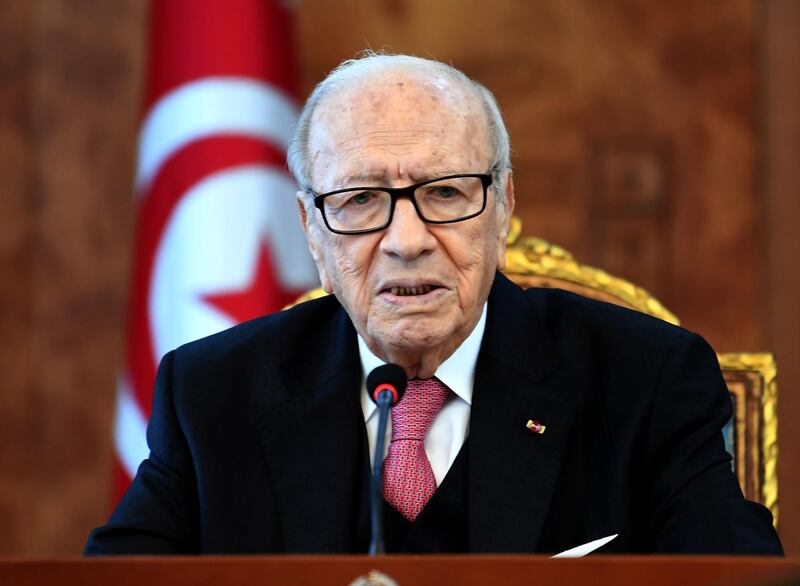Much of Tunisia’s political elite gathered at the Presidential Palace on Monday after President Beji Caid Essebsi publicly withdrew his support for Youssef Chahed, the country’s embattled prime minister, a day earlier.
In a television interview broadcast on Sunday, the 91-year-old president appeared to join a growing chorus of voices both within his party and the parliament calling for the premier to either step down or resign should the current economic crisis continue.
But, for many observers, the machinations within Tunisia’s Presidential Palace have little to do with the matters at hand and everything to do with next year’s presidential elections.
Pressure to oust Mr Chahed has been led in the large part by the President’s son, Hafedh Essebsi, the executive director of Nidaa Tounes, the political party his father helped to found in 2012.
Blaming Mr Chahed for the sluggish economy, high unemployment and the biting impact of a tranche of IMF reforms, the president’s son has amassed an unlikely alliance of trade unionists and leftists against the prime minister.
In response, Mr Chahed has turned to moderate Islamist party Ennahda, which has agreed to maintain its support of him. But it has called upon him to consider a cabinet reshuffle and to not run in the presidential elections next year.
In addition to the criticisms raised by his son, Mr Essebsi cited the dramatic dismissal of the country's Interior Minister Lotfi Brahem last month after a migrant boat sank, killing more than 100 people on June 3. He said he believed his sacking had contributed to the Al Qaeda-linked terrorist attack on Tunisian soldiers in Ain Sultan, Ghardimaou, an isolated and hardscrabble mountainous region in Tunisia's northwest, earlier this month.
“I know the interior minister (Lotfi Brahem). He is an excellent official in his job,” he told Tunisian broadcaster Nessma.
“His departure should have been put off to coincide with a future reshuffle of the cabinet. Its timing was not good. I salute the former interior minister for his good job.”
The president’s suggestion carries no legal or constitutional weight, but “politically it means a lot,” says Lamine Ben Ghazi of parliament watchers Al Bawsala.
“He doesn’t support Chahed. Instead, he’s decided to support the faction led by his son that, over the past weeks, has called upon Chahed to be removed.”
_______________
Read more:
Al Qaeda-linked group claims attack on Tunisian soldiers
Tunisia PM fires senior minister amid alarm over migrant deaths
Risks to Tunisia's economic stability requires immediate action, IMF says
_______________
The latest crisis appears to stem not from any heartfelt ideological opposition among its protagonists, but rather their bid for power in next year’s presidential elections.
"Youssef Chahed wants to be the main candidate in the 2019 elections. To do that, he needs to control Nidaa Tounes, or at least the secularist camp," Hamza Meddeb, a research fellow at the European University Institute in Florence, who specialises in Tunisian affairs says.
“However, this puts him in the way of Hafedh Caid Essebsi’s ambitions. Hafedh probably won’t run, but he wants to play kingmaker,” the analyst continues, referring to the president’s son. “Right now, Youssef Chahed’s trying to run without his support and, for Hafedh, that makes him a potentially weak candidate and one that risks splitting the secularist camp.”
Tunisia’s economy was already showing signs of struggle at the onset of its 2011 revolution, but poor management, social unrest and a series of terrorist attacks have all accelerated its decline.
As of June, inflation was running at 7.8 per cent. The Dinar, the country’s national currency, has fallen from 1.57 to the dollar in October 2012 to 2.63 today.
The attempted price increases in January of this year, before a public government climbdown, resulted in countrywide protests and unrest. A bloated public sector and high unemployment elsewhere have also exacerbated matters.
While Tunisia’s political elite grapple over their individual futures, parliamentary progress remains stymied and the country has been left to stagnate.
“This doesn’t advance reform at all. There are many important bills in front of parliament that are being ignored for this,” Mr Ben Ghazi says.
“They’re in deadlock. There is no authority.”





